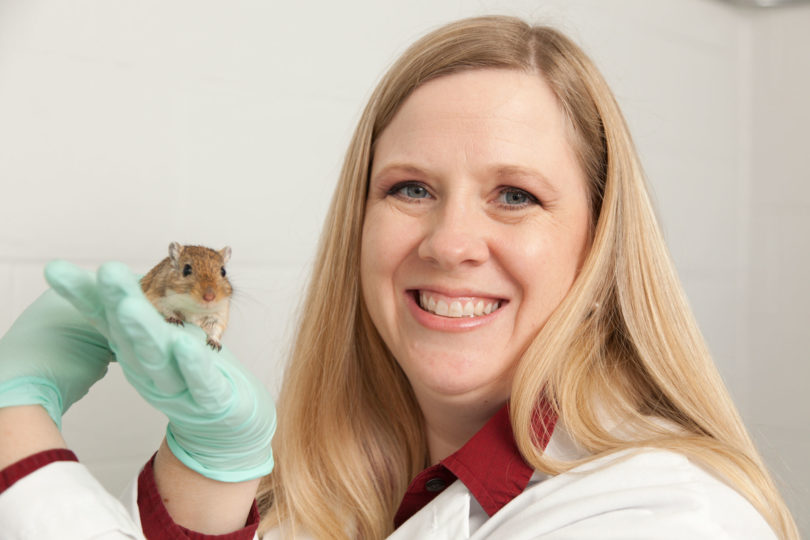Getting a blood sample from a gerbil isn’t always easy.
“If the handler is not well trained and experienced, there is a higher-than-average probability of animal injury,” said Lisa Kelly, training coordinator at the Office of Animal Care and Use.
That’s why Kelly is working with researchers in the College of Veterinary Medicine and the Biomedical and Health Sciences Institute to develop blood-drawing techniques that are easier for the novice technician to master and less stressful for the animal. Kelly works with investigators, research associates, animal care technicians and subject matter experts to provide or find training for a variety of species, from traditional rodents to birds to large agricultural animals.
“Anyone involved with animals in a campus laboratory must learn safety procedures and understand the legal responsibilities,” said Kelly.
Researchers and technicians must know how to employ humane handling methods that also protect the handler, how to set up appropriate warning signage and to follow Animal Welfare Act regulations.
The OACU provides two mandatory online training modules that cover required basics: “IACUC 101” and “Staying Healthy While Working with Laboratory Animals.” The former, named for the Institutional Animal Care and Use Committee, familiarizes researchers and technicians with the laws and guidelines on the institutional use of research animals. The latter covers occupational health issues and ways workers can stay safe. Kelly steers them through the modules and helps them to apply the information to their specific situations.
In addition to the required modules, Kelly’s job also includes anything from showing how to safely handle a goat to finding the best procedures for maintaining healthy fish. She also encourages investigators to use the training office as a resource and has a missionary zeal for convincing technicians and staff to get the Animal Technician Certification offered by the American Association for Laboratory Animal Science.
“AALAS certification is considered the industry standard for competence in the field of laboratory animal science,” said Kelly. “This program is valuable for many people working with animals in research, from the entry level animal care professionals to the advanced laboratory or research technician.
“It is important that people see animal technicians—and that the technicians see themselves—as professionals who assure that the animals used in research receive the highest standard of care,” she also said. “The most rewarding thing is seeing people gain confidence in their work, and the AALAS certification helps build that.”
Chris King, director of the OACU and assistant vice president for research, believes the training office offers much-needed services to the research community.
“The OACU isn’t just about oversight. It is also a resource,” he said. “Lisa Kelly has helped implement access to the AALAS Learning Library and definitely has a customer service focus. All our staff works hard to get that message across.”
“Here at UGA, we have such a wealth of expertise and experience,” said Kelly. “I want to create a network that can connect researchers with the skill sets and information that they need. My role is to help, not hinder, research.”
Kelly especially enjoys seeing what she calls “that light bulb moment” when an individual begins to understand the significance of his or her role in research.
“They start to see how their small part makes a difference in big issues, such as finding solutions or curing disease,” she said. “After training, they’ll say things like, ‘Wow, I never realized that what I do is so important!’ And that is really awesome.”





